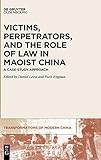Victims, Perpetrators, and the Role of Law in Maoist China : A Case-Study Approach / ed. by Puck Engman, Daniel Leese.
Material type: TextSeries: Transformations of Modern China ; 1Publisher: München ; Wien : De Gruyter Oldenbourg, [2018]Copyright date: ©2018Description: 1 online resource (VIII, 205 p.)Content type:
TextSeries: Transformations of Modern China ; 1Publisher: München ; Wien : De Gruyter Oldenbourg, [2018]Copyright date: ©2018Description: 1 online resource (VIII, 205 p.)Content type: - 9783110531046
- 9783110531091
- 9783110533651
- 349.5109/045 23
- KNQ120 .V538 2018
- online - DeGruyter
- Issued also in print.
| Item type | Current library | Call number | URL | Status | Notes | Barcode | |
|---|---|---|---|---|---|---|---|
 eBook
eBook
|
Biblioteca "Angelicum" Pont. Univ. S.Tommaso d'Aquino Nuvola online | online - DeGruyter (Browse shelf(Opens below)) | Online access | Not for loan (Accesso limitato) | Accesso per gli utenti autorizzati / Access for authorized users | (dgr)9783110533651 |
Frontmatter -- Acknowledgements -- Contents -- Introduction -- 1. Beyond “Destruction” and “Lawlessness”: The Legal System during the Cultural Revolution -- 2. The Intelligence Sleeper Who Never Was: Han Fuying and Case 5004 -- 3. A Different Category of Life: The Counterrevolutionary Case of a Rural Schoolteacher -- 4. Vetting the People’s Servant: On the Principles of Revolutionary Integrity -- 5. A Policeman, His Gun, and an Alleged Rape: Competing Appeals for Justice in Tianjin, 1966–1979 -- 6. From Denial to Apology: Narrative Strategies of a “Perpetrator” after the Cultural Revolution -- 7. The Floating Fate of a Rebel Leader in Guangxi, 1966–1984 -- Contributors -- Index
restricted access online access with authorization star
http://purl.org/coar/access_right/c_16ec
Eine erstmalige Analyse maoistischer Justiz auf Basis von Originalfallakten, die aufgrund ihrer plastischen Details einen tiefen Einblick in die chinesische Rechts-, Politik- und Sozialgeschichte geben. Durch die Betonung der Akteuersebene wird, jenseits von Metadiskursen, der totalitäre Charakter der frühen Volksrepublik China und der mehr oder minder großer Spielraum von Angeklagten, Richtern und politischer Führung ausgelotet. Der Band versammelt chinesische, europäische und amerikanische Wissenschaftler, um gemeinsam eine Revision des bisherigen Forschungsstandes zu ermöglichen.
The relationship between politics and law in the early People’sRepublic of China was highly contentious. Periods of intentionallyexcessive campaign justice intersected with attempts to carve outprofessional standards of adjudication and to offer retroactive justicefor those deemed to have been unjustly persecuted. How were victims andperpetrators defined and dealt with during different stages of theMaoist era and beyond? How was law practiced, understood, and contestedin local contexts? This volume adopts a case study approach to shedlight on these complex questions. By way of a close reading of originalcase files from the grassroots level, the contributors detailprocedures and question long-held assumptions, not least about theCultural Revolution as a period of “lawlessness.”
Issued also in print.
Mode of access: Internet via World Wide Web.
In English.
Description based on online resource; title from PDF title page (publisher's Web site, viewed 28. Feb 2023)


